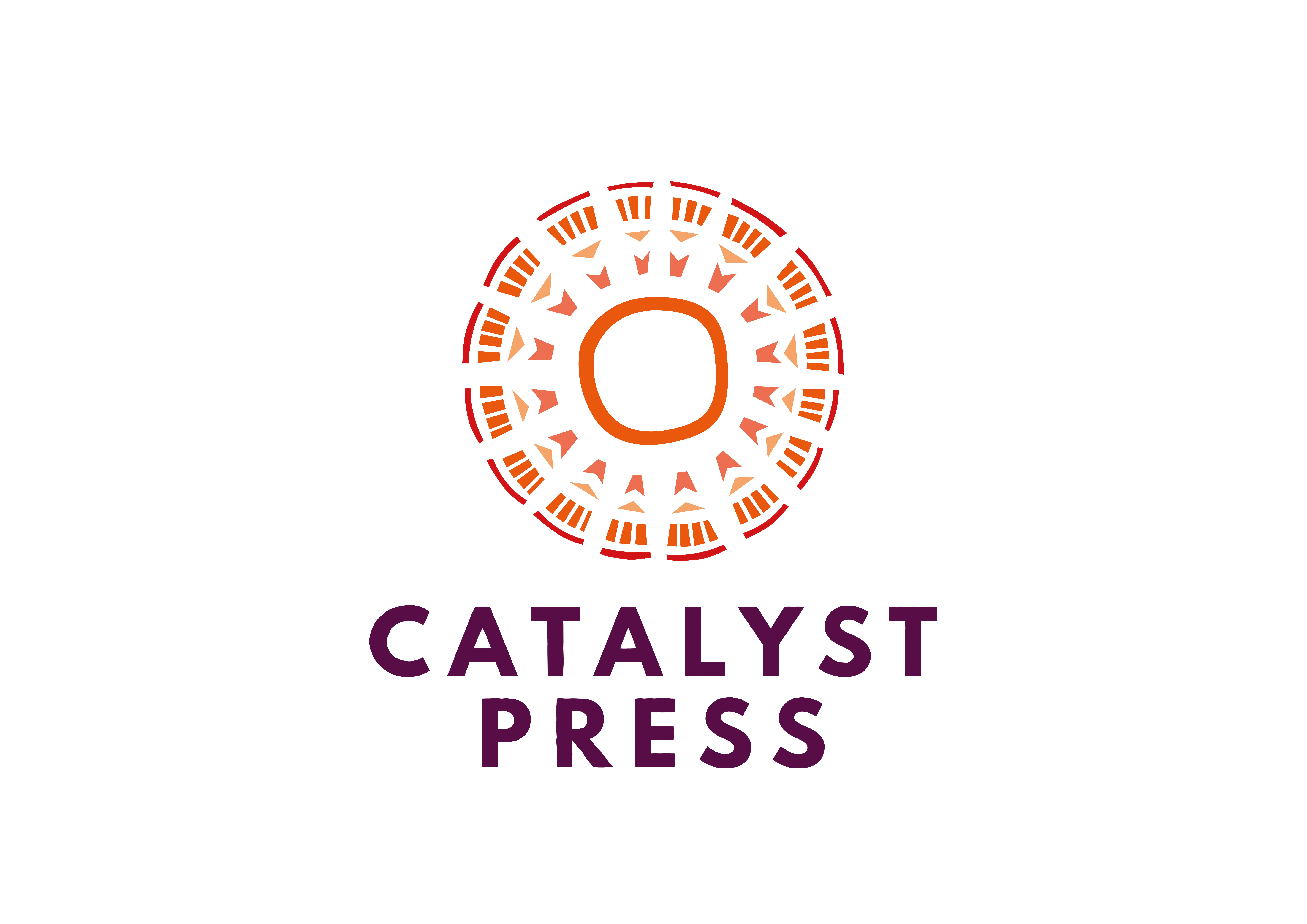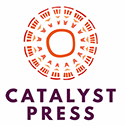Hi everyone!
If we haven’t met, I’m SarahBelle Selig and I’m the South African Office Head for Catalyst Press—or as I like to call it, “boots on the ground” in Cape Town for all things Catalyst. My role changes by the day: it could be publicizing a new book, meeting with our distributors, coordinating an event, or, my personal favorite, catching up with one of our amazing authors.
We’ve had a few big changes here in South Africa lately, including transitioning to our new local distributor, Protea Distribution, releasing a new fiction book and a graphic novel, and last but certainly not least, welcoming a new member to the team, Izak de Vries!

Izak is technically new to Catalyst, but he’s been a part of the Catalyst family for years. He previously worked for our former distributor Lapa Uitgewers, but he’s also been a close friend of Jessica’s for many years—so he’s been an incredible friend to the press since our founding in 2017, and has been a champion of our books in more ways than one. Now, Izak writes for LitNet, and he has graciously joined our team part-time to help me steer the boat and expand our work here in South Africa.
Whether it’s out and about at a book launch, or sipping cups of coffee in his Mowbray home with a dog in my lap, I love any opportunity I get to work with (and learn from) Izak, so I’m especially thrilled that he’s joined the team. And I can’t wait to introduce him to you today!
You can also stay up-to-date on Catalyst South Africa, by subscribing to our South Africa-focused mailing list (which will occasionally feature Afrikaans editions)
SarahBelle Selig: Izak, let’s start by chatting a bit about your background, and what you’ll be doing for Catalyst.
Izak de Vries: Thanks, SarahBelle. I was hoping that you would tell me what I’d be doing for Catalyst. LOL.
On a more serious note, I have been part of the media scene for more than 30 years and I have had numerous publishers as clients for about 20 years. That might date me, but it does mean that I know people to ask when I do not know or do not understand. While you are the boots on the ground, I’d be happy to help promote the Catalyst Press and to assist with whatever is necessary.
I am fluent in Afrikaans, and have many friends in the Afrikaans press and book worlds. Afrikaans-speaking readers tend to enjoy English books as well, and I love the Catalyst ethos of promoting African writing. So, part of my endeavors would be to help the Afrikaans-speaking community getting to know Catalyst Press.
SS: Well, thank goodness for that. Besides counting to ten—a relatively useless party trick, I’ve discovered—and a few expletives I shall not repeat here, my Afrikaans is slim to none.
Because of that, my understanding of the Afrikaans book world in South Africa is somewhat limited. Tell me about Afrikaans readers. What are they interested in? What are their reading habits? And what about South African book lovers as a whole? Are readers here different from other readers you’ve encountered around the world, in what they’re looking for and what they enjoy? What do you think it’s important for a book to have, to reach the hearts of South African bibliophiles?
IV: There is of course no single “Afrikaans” reader or “South African” reader. Afrikaans-speaking people are as diverse as are the South Africans, as are “American-readers”. You know better than I am that there is no “American” reader. Yet, having said that, we can spot some trends.
Let us start with Afrikaans. We have amazing poets in Afrikaans. A world-renowned poet is Breyten Breytenbach who had spent many years in a South African jail because of his affiliation with the (then) banned African National Congress. Antjie Krog has been read in many countries.
Nelson Mandela famously quoted the Afrikaans poet Ingrid Jonker when he opened the very first democratically elected parliament in South Africa. We also have many people of color who speak Afrikaans and write in Afrikaans. As in the USA, we have democracy now, but we still have major social inequalities and some of the most exciting poetry today comes from young Afrikaans-speaking people of color who deliberately do not use the language of the white minority in South Africa.¹ Names to look out for Ryan Pedro, Lynthia Julies, Nathan Trantraal, Ronelda Kamfer and Ashwin Arendse. Poetry sadly does not sell well in Afrikaans, despite the quality.
We have superb crime writers in Afrikaans—and their books sell remarkably well. Deon Meyer is the leading Afrikaans author in this genre. Romance books also sell extremely well—especially trope romance. Our young-adult market does very well in Afrikaans. A part of the Afrikaans-speaking (and in fact South African) community adheres to strict conservative views of Christianity, so books for that market sells well—ironically, but not surprisingly, the evangelical literature from the USA that gets translated into Afrikaans goes down well with conservative Christians. Yet, Afrikaans is a fully developed academic and business language, so we find books on nearly every subject in Afrikaans. More and more, though, we find that our non-fiction books in South Africa are written in English, often by Afrikaans-speaking authors.
So, who is the South African reader? Our cities, our corporations and our academic institutions compare with the best in the world. Our best readers read and buy world literature. Many of us read in a number of languages. South Africa has eleven official languages and a number of smaller ones. There are literatures in each. Sadly, not all the books in our local “black” languages sell well; most South Africans read English, irrespective of our home language.²
One of our famous South African authors, Wilbur Smith, has died recently. He had sold over a 140 million books throughout the world during his lifetime. So, lovely question, but the first part is nearly impossible to answer!
As for your last question, a good plot sells better than high-brow literature. We do read books from all over the world, but as always it is fun to recognize oneself in a set of characters, so books that value our continent and her people will find a warm spot in many South African hearts and bookshelves.
SS: A beautiful answer. Certainly, valuing Africa and her people is at the core of our mission at Catalyst, and we’re grateful to have you on board to serve as our guide and help us align our work even better with that. I feel like every conversation we have, I’m adding new South African authors to my TBR list!
Before we close out, how about some rapid-fire questions? You ready? Say the first things that come to mind. First up: if you could scream from the rooftops about one author right now, who would it be? Barring Catalyst authors, of course!
IV: Bernardine Evaristo. Her Booker-winning Girl, Woman, Other is about being black in the UK, but it is so clever, so intersectional and so witty that all of us in the USA and in South Africa would benefit from reading it.
SS: Favorite childhood book?
IV: Gosh, I guess it will be Groenmannetjie 737, meaning Little Green Man 737. I have always loved flying and this little green person could planet hop in his flying saucer. With books I still travel faster than the speed of light to amazing destinations, even as an adult.
SS: What’s next up on your TBR list?
IV: Zakes Mda’s Wayfarer’s Hymns.
SS: Describe your favorite bookstore you’ve ever visited.
IV: That’s hard, but right now it must be The Book Lounge in the heart of Cape Town. It is close to Parliament, our version of the US Capitol. It is an indie. They sell amazing books, create opportunities for book launches, have televisions shows broadcast from there and on Saturdays, pre-Covid, they used to have a kids’ zone where youngsters could listen to stories being read. That is not all—The Book Lounge is known as a safe zone for the LBGTQI+ community, especially for young people. It also is situated in a beautiful old building. I seem to remember that you have once written a lovely article on The Book Lounge?
SS: Great memory! I wrote it for World Literature Today. Maybe my favorite piece I’ve ever written. Okay, last two questions. If you could travel to one literary destination, anywhere in the world, what would it be?
IV: Timbuktu. It used to have a university centuries before the West emerged out of the Middle Ages.
SS: And lastly, pick a fictional character to have dinner with.
IV: Dumbledore. He has so much wisdom and empathy—besides, imagine the food that his wand would conjure up!
SS: And the spells he could teach you! Great pick. Thanks so much, Izak. Everyone, please join me in welcoming Izak to the Catalyst team!
—-
1. More from Izak: “There are a number of variants in Afrikaans. One is the so-called “standard” Afrikaans which we use for more formal writing. The young social activists often write poetry in Kaaps or in Gariep – which are variants mostly associated with people of colour – despite the fact that these young poets are fluent in the “standard” variant of the white minority.”
2. For example, Zulu, Xhosa, Sotho and the families of these.



